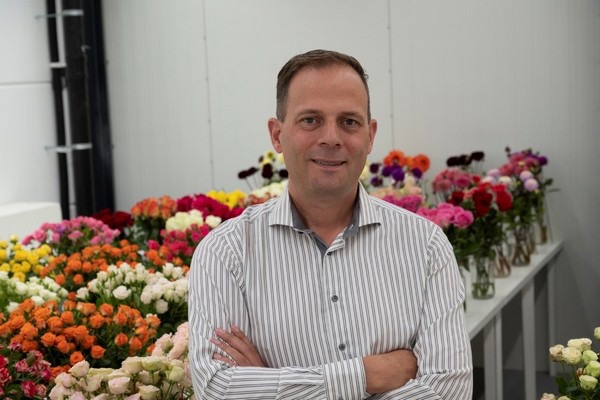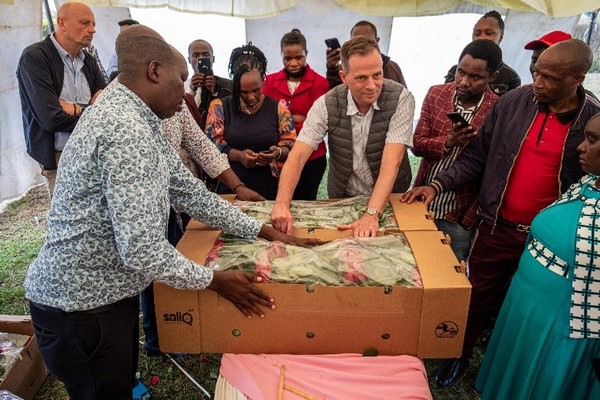It's been almost 18 years since FlowerWatch started writing quality reports, but now they do so much more than that. "We now have an online platform that brings together data from the entire supply chain into a dashboard," says scientist and floricultural entrepreneur Jeroen van der Hulst, Managing Director of FlowerWatch.
Thanks to the experience that FlowerWatch has gained over the years, they can see where the problems in the supply chain are and where value can be unlocked better than anyone else. And as Jeroen points out: "It's not rocket science, but all in all, it's definitely worth it. Everything has to be on point so you can have the maximum effect. Our job is the sum of all of those individual steps, and it's a pretty awesome job at that."
 Jeroen van der Hulst (the owner of FlowerWatch) in the new test facility in Roelofarendsveen.
Jeroen van der Hulst (the owner of FlowerWatch) in the new test facility in Roelofarendsveen.
Looking beyond the Netherlands
Things used to be 'local-for-local,' but now, the market is focused on 'global-for-global,' and billions of euros worth of flowers are sent around the world. Despite the size of the market and the success of Dutch flowers in it, things are still not quite right. There is still a lot to improve regarding logistics in the Netherlands.
"We are actually seeing that the amount spent on transport is enormous, as much as 40 to 50%. This can be done many times cheaper. For example, we now send flowers dry in a box in reefer containers from Kenya to all kinds of countries worldwide, with a load factor 500 percent higher than a Dutch truck with flower buckets. So you can see that there are opportunities in that aspect," says Jeroen.
"For example, an auction cart filled with flower boxes. Now, we unwrap those flowers, cut them, and put them in water. Then you suddenly have 3 to 5 carts filled with flowers that need to be transported. But if the packaging is good enough to cover a distance of 7,500 kilometers, then why isn't it good enough for the last 200 kilometers?"
Not only in the amount of transported flowers but also in the way in which the flowers are transported, Jeroen sees many points for improvement, both in terms of packaging and quality. "When my people in Kenya check crop buckets at the nursery, 75% of the growers get top marks. If we do the same in the Netherlands with auction buckets, I can't give them the same grade. It might just be passable. You can have the best refrigeration, but without clean buckets, good refrigeration is worth a thing."
Jeroen calls this 'the law of the slowing lead,' or to put it more simply: "We are running a little behind because of our success instead of continuing to innovate like other emerging countries that are now taking the lead. We may just have the least efficient flower transport system you can imagine here in the Netherlands. But if we can get more flowers in the same shipment, at lower prices, and with a lower carbon footprint, we can easily expand our market. This has already led to change in the rest of the world, but in the Netherlands, the market is so fragmented between grower, auction, and trade, that this change doesn't happen as fast."
The solution
Now that we know that there are areas for improvement, the question remains: How should we tackle these issues? According to FlowerWatch, the solution lies in improving logistics and quality. With their scientific and practical background, FlowerWatch tries to streamline the supply chain so that the things that are bought also arrive in good condition at a good price. According to Jeroen, the current game in the flower business is a game of 'who has the best logistics.'
According to Jeroen, a large part of the scientific knowledge regarding post-harvest processes and sea freight was already known in the early 1980s but is only now beginning to be applied in practice. "And if we do that, things can go fast. For example, you can send flowers via container before peak days or fly three weeks before, for instance, Valentine's Day, and then store them in the Netherlands under the right conditions. As a trader, you can then buy much more of a product from the same reliable supplier. Instead of ten growers, you go for five whose quality you know."

Jeroen van der Hulst (middle - owner FlowerWatch) and Isaya Muiru (left - Senior trainer FlowerWatch) demonstrate how to optimally pack a sea freight box.
In addition to collecting data and providing insight into the performance of the logistics chain, the company focuses on improving and creating value in the chain. FlowerWatch has an online platform that supports all of this. The platform runs with customers in Scandinavia, Europe, Kenya, Ethiopia, and South America and offers users knowledge, skills, and tools to tighten logistics and thus stay ahead of the competition. "We have also drawn up quality standards that detail how we think each link in the chain should function. The standards are called 'Quality standard for global flower supply chains.'"
But something else is needed for this change as well, and that's parties who are willing to develop and grow. "We need to have front runners because, in this rapidly changing flower world, waiting is not an option."
"You must be on top of things and understand what is happening around you. As FlowerWatch, we are the party that can quickly work with companies to get flowers to storage faster and increase the amount transported. We can accelerate the innovation and development process. That's where I think our value lies."
For more information:
Jeroen van der Hulst
FlowerWatch B.V.
Noordeinde 144a
2371 CX, Roelofarendsveen
+31 71 331 90 58
[email protected]
https://www.flowerwatch.com/en
